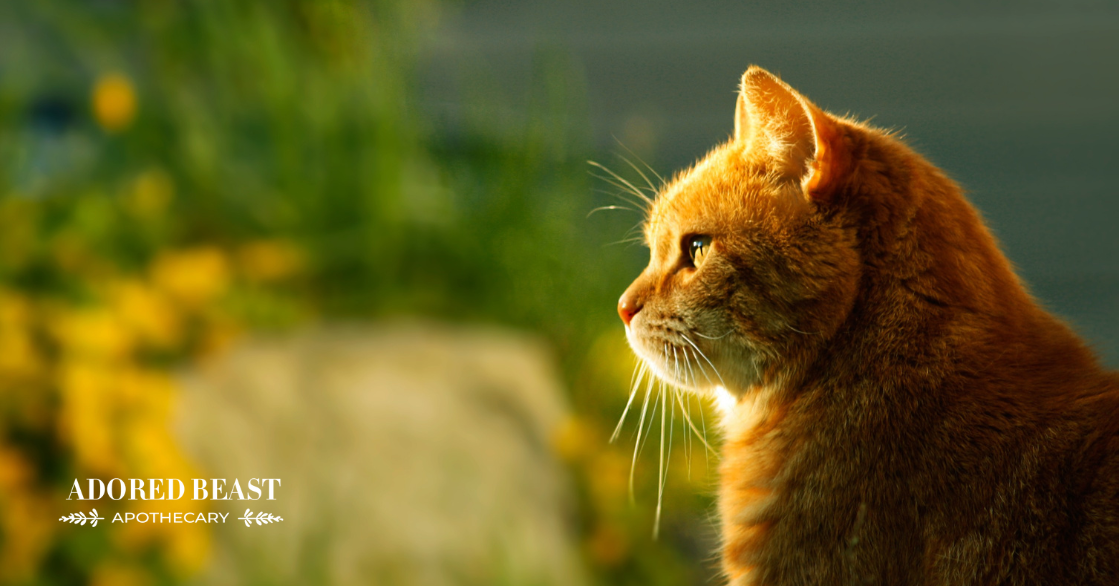Here at ABA, our goal is always to look to Nature to find the solutions to our animals’ health concerns. Taking a holistic approach to health, looking a the bigger picture and the root causes of disease, in our opinion, is the best way to find a long-term solution.
But we know that there are many situations where pharmaceutical options are what makes the most sense.
Steroids for cats are one of those options. Steroids are commonly used in veterinary medicine. In some cases, they truly are life-saving! However, it is our founder’s view that they should only be used as a last resort or to treat a life-threatening condition. Yet, they are used to treat a variety of conditions in cats, including allergies, inflammation, and immune system disorders, and their use can have side effects, so you want to support your animal afterwards.
So that’s what this post is about!
Short and Long-Term Side Effects of Using Steroids for Cats
Short-term steroid use can cause side effects, but they tend to be less severe and reversible once the medication is discontinued. Saying that, some cats can develop steroid-induced diabetes even after a single injection of certain steroids or even a short term course, so please watch and monitor your cat carefully. (Checking urine with a glucose stick is an easy way to monitor.)
Common short-term side effects include:
- Increased thirst and urination
- Increased appetite
- Behavioural changes
- Panting
- Temporary digestive upset
Long-term use of steroids for cats, particularly at high doses, can lead to more serious and potentially irreversible side effects. These may include:
- Diabetes mellitus
- Muscle weakness and wasting
- Weight gain and obesity
- Skin and coat changes
- Suppressed immune system
- Cushing’s syndrome (hyperadrenocorticism)
- Gastrointestinal ulcers
- Liver changes
- Behavioural changes (chronic)
- Adrenal insufficiency
Supporting a Cat After Steroids
If your cat requires steroids, you want to do all you can to support them during use and once you’ve weaned them off safely.
1. Support with a Balanced Diet
Steroid use can cause weight gain, muscle loss, and changes in your cat’s appetite. To help your cat recover, provide a nutrient-dense, balanced diet (of course, this is important during the steroid use as well!). Choose a high-quality, easy-to-digest protein diet to help rebuild muscle and maintain overall health. We’re proponents or a raw diet, but a home cooked diet is also good. At the very least, go for a wet food to avoid dehydration.
2. Hydration
Steroids can increase thirst and urination (polydipsia and polyuria), which may leave your cat at risk of dehydration once the treatment is stopped. Make sure your cat has access to plenty of fresh water at all times. As mentioned, dry food won’t help hydrate the body, so choose a food that has moisture in it (raw, cooked, wet).
3. Monitor Weight and Activity Level
Steroid use often leads to increased appetite and weight gain, so it’s important to monitor your cat’s weight post-treatment. Gradually return your cat to a normal feeding schedule, and avoid overfeeding to prevent further weight issues. But do it slowly, as steroids really do make them feel like they are starving.
Encourage light exercise and play to help them regain any muscle lost during steroid use. If you can, get outside with your kitty for some fresh air. Gentle play sessions with toys or short bursts of activity can help your cat stay physically active without overwhelming them. If they are indoor cats, please be sure to use a harness or find super cool ways of playing inside.
4. Supplements to Support Recovery
There are many supplements that can help support your kitty as they recover from steroid use:
- Probiotics: Steroids will often disrupt the balance of gut bacteria, leading to digestive issues. Probiotic supplements can help restore a healthy gut microbiome and improve digestion.
- Antioxidants: Supplements like vitamin E and C, or those rich in antioxidants, can help reduce oxidative stress and support your cat’s immune system after steroid treatment.
- Omega-3 fatty acids: These are natural anti-inflammatories and can help support your cat’s skin, coat, and joint health before, during, and after steroid use. Our Potent Sea has high levels of EPA and DHA, but is sustainably sourced!
5. Support the Liver
One of the most important things you can do after using steroids for cats it to support the organs that filter and cleanse the body. The liver – the body’s biggest detox organ – processes and filters steroids through the body. When healthy, it can expel the chemicals from this steroids from the body, which is paramount in getting the body back to balance.
Certain herbs and botanicals have been traditionally used to support liver health in cats. Milk thistle, dandelion root, burdock root, chamomile, and turmeric are all examples of herbs with hepatoprotective (protective of the liver) properties that can help support liver function and reduce inflammation. Also, make sure to minimize stress as much as possible as it can negatively impact liver function!
Steroids for cats can be life-saving for animals with certain medical conditions, but they come with some heavy potential side effects, especially when used long-term. It’s important to support your kitty during and afterwards, for at least for 3- 6 months, to help them get back to their best!












